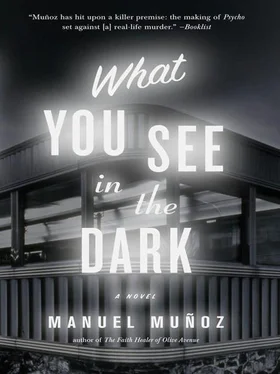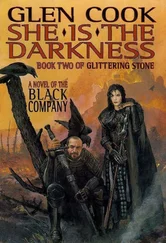Seeing herself in the mirror, she suddenly felt calm, the idea of her singing not so ludicrous.
She began, her fingers already on the strings, and she strummed the first notes, watching herself in the mirror as the opening words came out of her mouth:
I had a man
In Abilene
Man of my dreams
But lowdown mean.
She was mesmerized by the sight of her hands caressing the guitar, her fingers moving in time over in that mirror and keeping up, but it lasted only a moment — Teresa felt the next notes getting away from her, and she stopped singing but kept playing. She had to bend her head to watch the strings, to concentrate, to remember the words and keep time.
Prettiest eyes
I ever seen
In Abilene.
The song had escaped her: her voice was clear, but her guitar playing lagged behind badly and she had to strum the chords between lines a few times to catch up. As she sang, her mind wandered to the ease of those women on the television sets, all of their energy focused just on the emotion of a song she couldn’t even hear through the heavy plate glass. They had it easy, she thought, struggling, her knees growing heavy from the guitar. She watched the strings, watched her fingers, but when she neared the last verse, she stopped playing the guitar and just hummed, looking up at herself in the mirror, focused entirely on the way she always wished she could see herself: poised, controlled, assured, brave. Not lonely, not frightened behind two locked doors, not longing for her mother, not longing for Cheno to be a different man, not opening her eyes to yet another morning of a life with no one in it, no money, her heart too heavy with worry. Her own image in the mirror showed this to her with such nakedness that she found herself singing as loudly as she could, and she surprised herself at how much lament she was able to muster, as if to make up for her uninspired performance, as if to sing out to herself in the mirror. She wanted to watch herself, but she found her eyes closing, her head rising up some as if the last notes knew on their own that they could slide out of the arch of her throat.
Dan clapped from his dark spot, emerging into her honey light, smiling so widely that Teresa could only believe he was doing so to make her feel better. She looked down at the guitar as if it were to blame, and as Dan’s boots sounded closer against the wooden floor, she felt foolish and sorry for herself. That was what she had seen in the mirror — her own deep need, all of her longing apparent — but nothing about it could be appealing. She thought of Cheno watching her in front of Stewart’s Appliances and had to look at the floor.
“Don’t put your head down,” Dan admonished her. “That was great.” Then he reached over slowly and tipped her chin up, one finger and tenderly. He didn’t keep it there, but Teresa wished he had, just as in the movie advertisement she’d seen outside the Fox Theater downtown, a woman with watery eyes looking up at a man, his hand on her cheek.
“Thank you,” she said, but she couldn’t look at him, at his brown eyes, nor back down at the guitar strings, so she went back to herself, over in the horizon of mirror, looked at herself as Dan Watson stood over her, his wide back, and the honey light coming down.
“You’re a good singer,” he said. “A sad voice sells a lot of beers.”
“Sad songs are good?”
“Oh, yes. Especially here. If you want to dance, you go over to Ed’s place. Get drunk and cry? Right here.”
Dan reached over for the guitar and she gently released it to him. Confidently, he started up the song again, this time with a bold, strong rhythm and none of her hesitation. She watched his fingers along the fret board, astounded. They were strong hands, agile, one dancing along the arm of the guitar with instinct, the other striding along with equal, easy fervor. “Your guitar playing needs a little work, though.”
She laughed, but he kept playing, smiling back at her. He wasn’t watching his fingers — he didn’t need to. Dan Watson was looking right at her, his brown eyes wide and inviting. “Sing,” he said. “Come on.”
What the song sounded like, now, was what she remembered from her days with her mother, and she didn’t need to close her eyes to make the words arrive. They came on their own, and because Dan Watson was now blocking her view of herself in the mirror, she looked at him as she sang. She kept her voice low, but the feeling was there, the sorrow. But now she was beginning to understand that such sorrow had a different shading to it, that it could lift into something else if she permitted herself to sink exactly into the whirl of Dan Watson’s brown eyes, the eyes the song warned about.
Teresa kept her voice low and the two of them carried through the song with an easy harmony that actually made her smile when they finished.
“I knew what song you were trying to sing,” Dan said. “My mama used to listen to it a lot.”
“So did mine,” Teresa said. “It was one of her favorites.”
“You changed the words around.”
“I didn’t remember them,” she admitted. “Or I remembered hearing it differently.”
“You start inventing words, that’s true,” Dan said, handing back the guitar. “Playing is harder than it looks. You practice a lot?”
“Not enough. I don’t know that much about how to play.”
“Who taught you? Your daddy?”
She couldn’t find the best answer, thinking of Cheno outside, wondering if he was searching up and down the street for her.
“You have a nice voice, though,” he said, reassuring her.
He stood smiling at her, and when Teresa couldn’t think of how to respond, she laughed nervously. He laughed with her but wouldn’t say anything more to help her out of the fluttering tension in her hands, her stomach, her throat. She looked down at the guitar and picked at one of the strings.
Dan reached over and moved her left hand to the fret board, positioning her fingers. “Right there. Bend this finger. Firm as can be.” Satisfied with her grip, he eased right behind her with one solid step and cast his arm over her shoulder. Not touching her, but close enough for Teresa to feel the soft fabric of his shirt. He helped her play the briefest of notes, just the beginning of something, unsaid and unsung and sad-sounding enough to warrant feeling that way, and then stopped.
Outside, through the open door, a vehicle sounded across the gravel, slowing down. The vehicle stopped and they could hear a door open and close. “That’s Ed,” he said. “Across the street.”
He stepped away from her, and Teresa rose from the stool to look out the door, but all she saw was the vehicle — another Ford truck — and Cheno nowhere in sight.
“Sing for me,” Dan said.
“That’s the only song I know.”
“No,” he said, shaking his head. “I mean, sing for me, not Ed.”
That’s how it begins, the women on the television told her. You have to open your arms wide first.
“I’ll play guitar,” Dan said. “Or someone else will. All you have to do is sing.”
Across the street, the door to Ed’s bar stood wide open, but it wasn’t a place she wanted to enter anymore.
“I can’t pay you,” said Dan quickly. “You can keep any tips, though.”
Had Cheno come and gone? She thought of what he might say when she presented this situation to him, but what made her dismiss him was the spark of her mother’s voice, the need when she sang along with those records, and what bloomed in Teresa was something close to forgiveness. Of course her mother would’ve boarded the bus to go back to Texas.
“Okay,” Teresa said, and nodded. “I’ll sing for you.” Then she froze. “You don’t mean tonight, do you?”
Читать дальше












